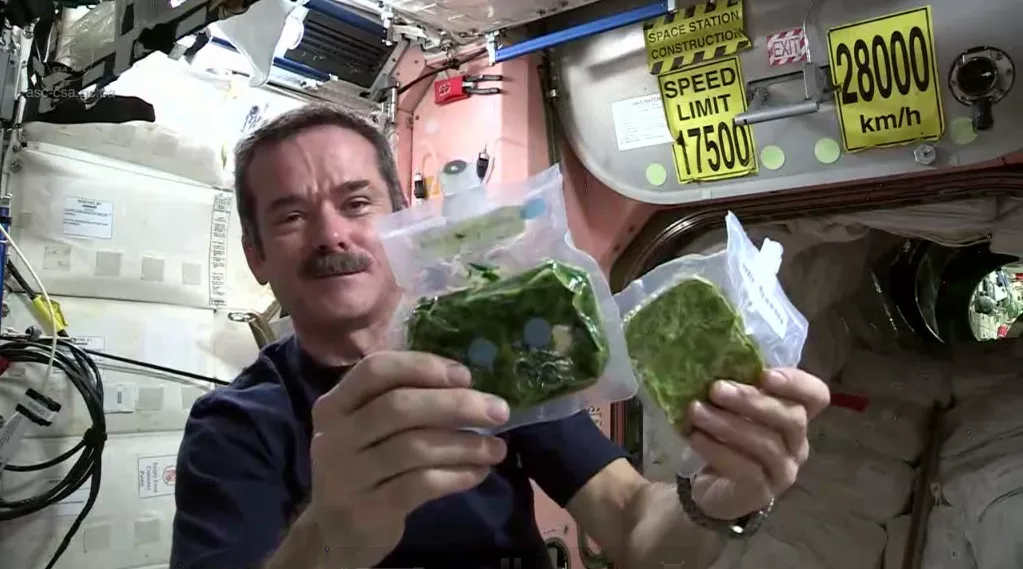Last year, the Japanese Space Agency launched its third Seeds in Space programme, within the Asia-Pacific Regional Space Agency Forum (APRSAF).
Since New Zealand is a member of APRSAF we are participating this year as well, with two projects. One is to grow seeds in tandem with the International Space Station experiment. The other, is to measure the viability of Pohutukawa seeds after they have been to space.
Why growing herbs in space?
Eating in space is complicated. So far, food is being sent from Earth already prepared with fancy menus that require lots of planning months in advance. Sometimes astronauts cook themselves the meals. But imagine there will be a day when the astronauts will cook all their food on the spaceship, from dried or even fresh ingredients.
And there is more.
Scientists who researched human behaviour in small, confined places, believe that one of the best ways to prevent boredom in long duration space flight is … astronauts cooking.

Since in the meantime cooking in space is still going to be from rehydrated ingredients, the easiest way to make the food taste better would be to season it with real herbs.
Growing herbs is easier than grow other plants. After all, who hasn’t had the traditional supermarket bought basil growing on their window ledge? But how many people do you know who tried to grow potatoes or apple trees on their window ledge?
Professor Naomi Katayama, Nagoya Women’s University (Credit: Prof. Katayama)
Professor Naomi Katayama from Nagoya Women’s University discusses herbs in her article on the Japanese Space Agency’s Kibo Utilisation Office for Asia (KUOA) page.
She defines herbs as edible plants, which sometimes are used as medicines: basil, coriander, arugula, parsley, sage, rosemary, thyme, etc. These herbs play a major role at our dining table, sometimes are used as medicines and are essential plants for future space life. (Read here her article)
Growing plants in space will be defined by the space available - pun not intended
In space, plants will have to grow in tight spaces with limited air, water and supplies. Right now it is easier to send food on the ISS but astronauts started growing plants in space, in a container called “Veggie”. Small steps for humankind, fresh herbs will be easy to grow in space than the plants to start with. Herbs have a very distinctive taste and a unique scent, which gives them a variety of flavours and aromas.
Creating interesting menus with herbs
Professor Katayama believes that in long duration space flight, days could be kept in check without one losing the sense of time by scheduling the food we eat. For instance, here on Earth, we can tell the seasons by looking at changes that are happening in nature, on a spacecraft en route to Mars, not so much. She explains that, for instance, astronauts may use basil for Monday dishes, coriander for Tuesday, arugula for Wednesday, parsley for Thursday, rosemary for Friday, thime for Saturday, sage for Sunday, and so on.
Plants are great for the mental health of the astronauts.
When looking after plants, apart from becoming very patient some people feel very happy. A NASA article about growing plants in space concludes that “fresh flowers and gardens on the International Space Station create a beautiful atmosphere and let us take a little piece of Earth with us on our journeys. They’re good for our psychological well-being on Earth and in space. They also will be critical for keeping astronauts healthy on long-duration missions.”
Herbal scents are calming, inducing a good night’s sleep, and conversely refreshing and awakening. “Parsley is packed with vitamin K — an essential nutrient for bone health.” (Healthline.com) Fresh herbs also contain a lot of Vitamin C. We cannot make Vitamin C in our bodies like mice. So herbs can come to help.
All of these above are good reasons for us to learn how to grow herbs in space. We hope you will join us in this experiment. Learn more about our project and


